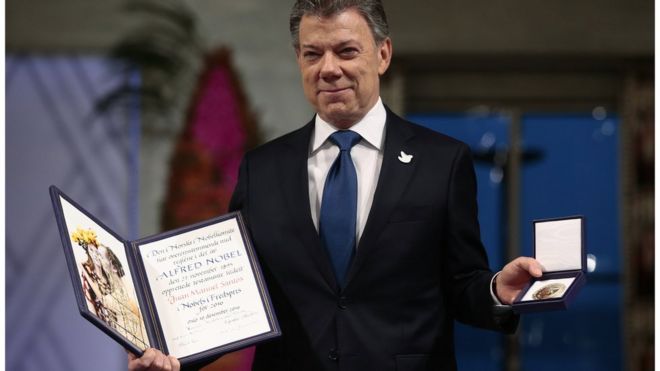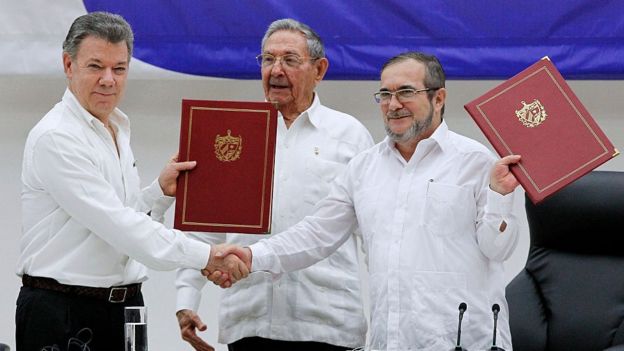- 7 hours ago
- Europe
-
(유럽) 노벨평화상 수상자 산토스 콜롬비아 대통령 마약에 대한 전쟁 재고하자고 요청국제문제/유럽 2016. 12. 11. 10:35
출처: http://www.bbc.com/news/world-europe-38275292
Nobel Peace Prize: Santos calls for 'rethink' of war on drugs
 AP
AP"From my own experience... it is much harder to make peace than to wage war," Santos said The President of Colombia, Juan Manuel Santos, has used his Nobel Peace Prize acceptance speech to call for the world to "rethink" the war on drugs.
He said the zero-tolerance policy might be "even more harmful" than all the other wars being fought worldwide.
Mr Santos' government and the country's biggest rebel group, the Farc, signed a peace deal last month.
The conflict it ends has killed more than 260,000 people and left millions internally displaced.
Accepting the prize for his efforts in the peace process, Mr Santos paid tribute to the families of victims of the conflict.
Has the war on drugs been lost?
Juan Manuel Santos: From hawk to dove
He said the "great paradox" of peacemaking was that "the victims are the ones who are most willing to forgive, to reconcile and to face the future with a heart free of hate".
In a deviation from his prepared remarks, he asked the representatives of the victims present to stand and be recognised for their own efforts in the peace process, to much applause.
Watch Juan Manuel Santos honour victims of the conflict by asking them to stand up during his award ceremony He has previously pledged to donate the prize money - eight million Swedish krona ($925,000) - to help the conflict's victims.
"I have served as a leader in times of war - to defend the freedom and the rights of the Colombian people - and I have served as a leader in times of making peace," he said. "Allow me to tell you, from my own experience, that it is much harder to make peace than to wage war."
No war on drugs
Mr Santos said it was "time to change our strategy" on drugs, and that Colombia had "paid the highest cost in deaths and sacrifices" in the so-called war on drugs.
Colombian President Juan Manuel Santos speaks to HARDtalk’s Stephen Sackur The term, coined by US President Richard Nixon more than four decades ago, refers to US-led efforts to stop drug production at its source. In Latin America this has included on-the-ground policing, and fumigation of coca fields from the air.
"We have moral authority to state that, after decades of fighting against drug trafficking, the world has still been unable to control this scourge that fuels violence and corruption throughout our global community," he said.
"It makes no sense to imprison a peasant who grows marijuana, when nowadays, for example, its cultivation and use are legal in eight states of the United States.
"The manner in which this war against drugs is being waged is equally or perhaps even more harmful than all the wars the world is fighting today, combined."
Other laureates
Nobel prizes in the sciences, economics and literature were awarded at a separate ceremony in Stockholm.
Bob Dylan, the first songwriter ever to receive the prize for literature, was the only one who did not collect in person, having said in advance that he was unable to attend due to previous commitments.
He received a standing ovation nevertheless, and the Nobel Committee praised the poetry of his song-writing as "worthy of a place beside the Romantic visionaries".
Patti Smith restarted her performance half way through, telling the audience: "I'm sorry, I'm so nervous" The singer-songwriter Patti Smith performed his song A Hard Rain's A-Gonna Fall, but forgot the lyrics part way through and apologised to the audience, saying she was nervous.
The other Nobel prizes given out by the Swedish King Carl XVI Gustaf were:
- Physics: David Thouless, Duncan Haldane and Michael Kosterlitz
- Chemistry: Jean-Pierre Sauvage, Fraser Stoddart and Bernard Feringa
- Medicine: Yoshinori Ohsumi
- Economics: Oliver Hart and Bengt Holmstrom
 GETTY IMAGES
GETTY IMAGESMr Santos (left) and Farc leader Timochenko (right) signed the original agreement in June The Colombian government's peace deal with the Farc was struck after many years of negotiations.
It hit a surprise hurdle in October this year when 50.2% of voters rejected it in a referendum.
Just four days after the unexpected referendum result, it was announced that Mr Santos would receive the prize. In his speech, he said the nomination was "equally surprising" and "came as if it were a gift from heaven".
Working alongside the no campaigners, the government wrote a new deal which was approved by Congress last month.
There were many armed groups involved in decades of conflict in Colombia, including left-wing rebel groups and right-wing paramilitaries. In October the government announced it would start peace talks with the second-largest rebel group, the ELN.
'국제문제 > 유럽' 카테고리의 다른 글
(유럽) 영국여왕 재위 65주년 기념 축포 41발 쏘다 (0) 2017.02.10 (유럽) 위키리크스 설립자 줄리안 어산지曰 내 自由를 회복시켜달라 (0) 2017.02.06 (유럽) 코로나 창업자가 고향주민 모두에게 유산 남겼다는 소식은 오보(誤報) (0) 2016.11.25 (유럽/프랑스) 프랑스 전 대통령 故 미테랑의 연애편지 (0) 2016.10.17 (유럽) 러시아 국회의원 최연소 야권 여성후보 나탈리아 (0) 2016.09.16